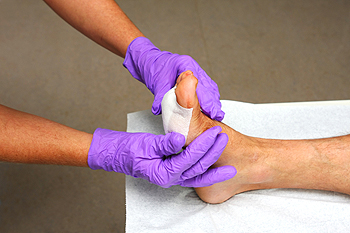
Foot wound care is essential for everyone, but it is particularly important for the elderly, who are at a higher risk due to drier skin and a greater likelihood of dehydration. Regularly checking feet for any cuts, blisters, or signs of infection is important. Applying moisturizer helps keep the skin supple, reducing the risk of skin tears, a common issue in this age group. Pressure ulcers and diabetic wounds also require close attention, as these can easily become serious if left untreated. Staying hydrated is important for overall skin health, so encourage regular water intake. If a wound shows signs of infection, such as redness, warmth, swelling, or pus, it is vital to consult a podiatrist promptly to prevent complications. Early intervention and proper care can make all the difference in maintaining foot health. If you are elderly or are taking care of a senior, it is suggested that you consult a podiatrist if any foot wounds need special care.
Wound care is an important part in dealing with diabetes. If you have diabetes and a foot wound or would like more information about wound care for diabetics, consult with one of our podiatrists from Kokomo Foot & Ankle Center. Our doctors will assess your condition and provide you with quality foot and ankle treatment.
What Is Wound Care?
Wound care is the practice of taking proper care of a wound. This can range from the smallest to the largest of wounds. While everyone can benefit from proper wound care, it is much more important for diabetics. Diabetics often suffer from poor blood circulation which causes wounds to heal much slower than they would in a non-diabetic.
What Is the Importance of Wound Care?
While it may not seem apparent with small ulcers on the foot, for diabetics, any size ulcer can become infected. Diabetics often also suffer from neuropathy, or nerve loss. This means they might not even feel when they have an ulcer on their foot. If the wound becomes severely infected, amputation may be necessary. Therefore, it is of the upmost importance to properly care for any and all foot wounds.
How to Care for Wounds
The best way to care for foot wounds is to prevent them. For diabetics, this means daily inspections of the feet for any signs of abnormalities or ulcers. It is also recommended to see a podiatrist several times a year for a foot inspection. If you do have an ulcer, run the wound under water to clear dirt from the wound; then apply antibiotic ointment to the wound and cover with a bandage. Bandages should be changed daily and keeping pressure off the wound is smart. It is advised to see a podiatrist, who can keep an eye on it.
If you have any questions, please feel free to contact our office located in Contact Us . We offer the newest diagnostic and treatment technologies for all your foot care needs.
